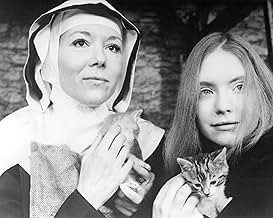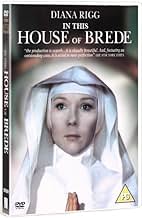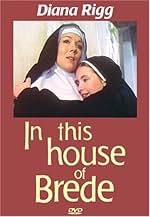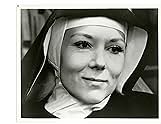Füge eine Handlung in deiner Sprache hinzuA well-to-do London businesswoman gives up her comfortable life, including the man who loves her, to become a cloistered Benedictine nun.A well-to-do London businesswoman gives up her comfortable life, including the man who loves her, to become a cloistered Benedictine nun.A well-to-do London businesswoman gives up her comfortable life, including the man who loves her, to become a cloistered Benedictine nun.
- Für 1 Primetime Emmy nominiert
- 1 Nominierung insgesamt
Fanny Rowe
- Miss Bowman
- (as Frances Rowe)
Dearbhla Molloy
- Dame Beatrice
- (as Dervla Molloy)
Yasuko Nagazumi
- Mariko
- (as Yasuko Magazumi)
Handlung
WUSSTEST DU SCHON:
- WissenswertesDiana Rigg, Dennis Quilley and Nicholas Clay also appeared together in "Evil Under the Sun"
- VerbindungenFeatured in The 27th Annual Primetime Emmy Awards (1975)
Ausgewählte Rezension
Diana Rigg has always been one of my favourite actresses, going way back to 1960's "The Avengers" television series. I had originally seen this film when it was first released to American television in the 1970's, enjoyed it, and then as the years passed, and the film went out of distribution, forgot about it.
When "Brede" was reissued on VHS, I watched the movie again, and remembered how much I enjoyed it. Coincidentally, I managed to find a copy of Rumer Godden's novel, In This House of Brede and set down to read it. There are many plot differences between the novel and the film (I spent 200 pages reading waiting for the "movie" to start), but the central themes remain intact - the quest for individual spirituality, grief, loneliness, the questioning of one's personal decisions, jealousy, envy, discipline, and most importantly, love.
The character of Dame Phillipa (Diana Rigg) is one who feels deeply, but builds up very thick walls for her own protection. What impressed me most about Rigg's performance is that she manages to express her pain, grief, and inner turmoil while holding back the tears... just as I imagine Dame Phillipa would.
Dame Agnes (Pamela Brown) is extraordinary. (Having gone to a Catholic grade school run by Benedictine nuns, I can assure you that there are a few like Dame Agnes out there!) She reminds me very much of Gladys Cooper's character, Sister Maria Therese in The Song of Bernadette. She is of the "old school", resisting change, new ideas, people of worldly experience, and terribly jealous of Dame Phillipa. In the final reel, we do understand what makes Dame Agnes tick, and with that realisation, we can forgive her uncharitable behaviour.
My complaints about the film are few. It looks very much like a dated made-for-tv film from the 1970's today. The music score, which is a symphonic-pop amalgamation, does not hold up well and is at times intrusive. There was also much left out of the book when it was transformed into the screenplay that could have been filmed with an additional 30-40 minutes running time.
The beauties of this film far outweigh its shortcomings. After viewing it, I suggest you find a copy of the novel (if you can, it's currently out of print in the United States) and enjoy the author's original, and more extensive story.
When "Brede" was reissued on VHS, I watched the movie again, and remembered how much I enjoyed it. Coincidentally, I managed to find a copy of Rumer Godden's novel, In This House of Brede and set down to read it. There are many plot differences between the novel and the film (I spent 200 pages reading waiting for the "movie" to start), but the central themes remain intact - the quest for individual spirituality, grief, loneliness, the questioning of one's personal decisions, jealousy, envy, discipline, and most importantly, love.
The character of Dame Phillipa (Diana Rigg) is one who feels deeply, but builds up very thick walls for her own protection. What impressed me most about Rigg's performance is that she manages to express her pain, grief, and inner turmoil while holding back the tears... just as I imagine Dame Phillipa would.
Dame Agnes (Pamela Brown) is extraordinary. (Having gone to a Catholic grade school run by Benedictine nuns, I can assure you that there are a few like Dame Agnes out there!) She reminds me very much of Gladys Cooper's character, Sister Maria Therese in The Song of Bernadette. She is of the "old school", resisting change, new ideas, people of worldly experience, and terribly jealous of Dame Phillipa. In the final reel, we do understand what makes Dame Agnes tick, and with that realisation, we can forgive her uncharitable behaviour.
My complaints about the film are few. It looks very much like a dated made-for-tv film from the 1970's today. The music score, which is a symphonic-pop amalgamation, does not hold up well and is at times intrusive. There was also much left out of the book when it was transformed into the screenplay that could have been filmed with an additional 30-40 minutes running time.
The beauties of this film far outweigh its shortcomings. After viewing it, I suggest you find a copy of the novel (if you can, it's currently out of print in the United States) and enjoy the author's original, and more extensive story.
- Jon Kolenchak
- 22. Dez. 2000
- Permalink
Top-Auswahl
Melde dich zum Bewerten an und greife auf die Watchlist für personalisierte Empfehlungen zu.
Details
Zu dieser Seite beitragen
Bearbeitung vorschlagen oder fehlenden Inhalt hinzufügen






























